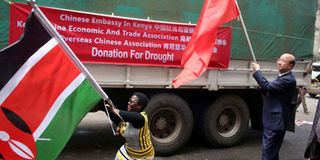Food aid and projects to enhance ties

Chinese Ambassador to Kenya Liu Xianfa (right) and Devolution Principal Secretary Josephta Mukobe flag off a lorry carrying relief food to drought-stricken residents on April 7, 2017. China is helping the government in alleviating the effects of the drought in the country. PHOTO | DENNIS ONSONGO | NATION MEDIA GROUP
What you need to know:
- At the request of the Kenya Government, China agreed to donate Sh2.25 billion worth of food.
- This humanitarian assistance is part of the continuation of the co-operation borne out of long-standing relations.
During the recent prolonged drought in Kenya, China was so moved by the plight of the affected people that it offered relief assistance.
At the request of the Kenya Government, China agreed to donate Sh2.25 billion worth of food.
The 21,336 tonnes will in the next few months arrive at Mombasa Port to bail out for one month the 1.4 million affected people.
At the same time, the Chinese community in Kenya has also rallied behind efforts to assist drought victims through donations of food and water.
FOREIGN AID
This is not the first time China is providing emergency humanitarian food aid to Kenya.
In 2011, when the country suffered another major drought, China donated Sh2 billion worth of food.
This humanitarian assistance is part of the continuation of the co-operation borne out of long-standing relations.
Indeed, China has a long history of ties with Africa, with its foreign aid to the continent having began in 1956, before most of the countries attained independence.
But it was in 1964, when the Chinese Government unveiled its Eight Principles for Economic Aid and Technical Assistance to other countries, the core content of which featured equality and mutual benefit, with no strings attached, which is the basic principle for Chinese foreign aid.
Since 2004, thanks to its rapid economic growth and enhanced overall national strength, China’s foreign aid has increased.
NATIONAL PRIORITIES
In addition to financing projects through traditional bilateral channels, consultations have been held by Chinese officials with representatives of recipients at the international and regional levels.
China has had well-articulated foreign aid policies at international and regional conferences.
Chinese aid to Kenya conforms to the general idea that such assistance should be in accordance with national priorities.
So, we support the goals and flagship projects in the “Vision 2030” and “Medium Term Plan”.
In response to severe water shortages in various parts of the county, China has in the past four years drilled 20 boreholes in western and eastern of Kenya.
Nearly 20,000 people are already drawing water from the wells for their domestic use and livestock.
CLIMATE CHANGE
On environmental protection and climate change, China has always been a good partner of Kenya.
It has provided equipment and technical cooperation.
China also works with the Kenya Wildlife Service and the Kenya Meteorological Department to protect wildlife, combat poaching, strengthen climate prediction and tackle climate change.
The two countries have had diplomatic relations since Kenya’s independence in 1963.
Over the past half-a-century, China has financed nearly 100 projects through grants, interest-free loans and concessional loans, to support infrastructure, health, education, agriculture, human resource, energy, environmental protection, and emergency humanitarian assistance such as food aid.
DEVELOPING HEALTH SECTOR
From the 1980s to 1990s, China helped Kenya to build the Moi International Sports Centre, Nairobi, with an interest-free loan.
This is one of the largest stadium in East Africa. Today, China is still implementing technical cooperation with the stadium.
Under grant and interest-free loans, China has built three hospitals, one at Eldoret, Mama Lucy Kibaki Hospital in Nairobi, Gatundu Hospital and a malaria prevention and treatment centre at the Kenyatta National Hospital.
These hospitals play important roles in their respective areas and neighbouring regions.
RESOURCE DEVELOPMENT
In cooperation in human resource development and education, China has expanded its training programme for Kenyan officials and technicians.
In 2015 alone, the number of trainees rose to 600, which is the second largest in Africa.
Besides, China has used grant and interest-free loans to support several universities.
This includes the Sino-Africa Joint Research Centre at Jomo Kenyatta University of Agriculture and Technology, the International Language and Culture Centre at Kenyatta University, the Confucius Institute Building at the University of Nairobi, and some primary schools in Nairobi and Taita-Taveta counties.
China will enhance cooperation, paying more attention to people’s livelihoods and enabling more ordinary Kenyans to benefit from the assistance.
It will support key projects to help Kenya attain its national development goals.
Mr Guo is the economic consular at the Chinese Embassy in Nairobi. [email protected]





